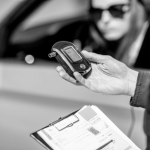Contributor: Adam Justinger
Any individual who operates a motor vehicle on a highway or on an area to which the public has a right of access in this state is deemed to have given consent and shall consent to a chemical test. This test can be by way of blood, breath, or urine. The chemical test must be administered by a law enforcement officer after an individual is placed under arrest for Driving Under the Influence (DUI) or Actual Physical Control (APC). The law enforcement officer decides which of the chemical tests to administer. If the law enforcement officer requests a blood or urine, a warrant must be obtained prior to administering the test. Prior to administering a chemical test, North Dakota law requires a law enforcement officer to read an individual the North Dakota implied consent advisory. So, what is the implied consent advisory and why is it important?
The North Dakota Implied Consent Advisory
The implied consent advisory informs an individual of the consequences for refusing a chemical test requested by a law enforcement officer. The implied consent advisory can be found under N.D.C.C. § 39-20-01(3)(a). The North Dakota implied consent advisory informs an individual that North Dakota law requires them to take a chemical test. If an individual refuses to take a chemical test, their driving privileges may be revoked for a minimum of one hundred and eighty (180) days and potentially up to three (3) years. Additionally, if an individual refuses a breath or urine test, it is a separate crime punishable in the same manner as driving under the influence. If an officer requests a blood test, they must obtain a search warrant before informing an individual of the criminal penalties associated with refusing the test.
If a law enforcement officer fails to inform an individual as required by the North Dakota implied consent advisory, the chemical test is inadmissible in both criminal and administrative proceedings. So, what does this mean? If a law enforcement officer does not properly advise you of the implied consent advisory, the chemical test indicating your Blood Alcohol Level cannot be used against you in court. An officer does not need to read the implied consent advisory word for word. However, they must convey all of the substantive information within the implied consent advisory. The major question for the courts is what is considered “substantive language” and what language is mere “surplusage” that can be excluded or even added. The North Dakota Supreme Court has recently helped clarify this issue in State v. Vigen.
State v. Vigen
In regards to the criminal portion of the North Dakota implied consent advisory, the statute specifically requires an officer to inform an individual that “[R]efusal to take a breath or urine test is a crime punishable in the same manner as driving under the influence.” Prior to the State v. Vigen decision, many officers around the state were only informing individuals that refusal to take a breath test is a crime punishable in the same manner as driving under the influence. The officers in these cases were administering chemical breath tests and not urine tests. It was their belief that they did not have to say the words “or urine” unless they requested a urine test. Prosecutors generally agreed with this assumption and did not think the words “or urine” were substantive to the implied consent advisory. However, defense attorneys argued that urine tests are very different than breath tests and by failing to include the criminal penalties for a urine test, individuals around the state were not being properly advised of the law by law enforcement.
The North Dakota Supreme Court determined this issue in Vigen. In Vigen, the officer failed to include the words “or urine” when reading the implied consent advisory. The North Dakota Supreme Court determined that the terms “or urine” are substantive to the implied consent advisory and cannot be omitted. Thus, the North Dakota Supreme Court determined that if an officer does not include the terms “or urine” the chemical test showing your BAC cannot be used in criminal or administrative proceedings.
Now What?
As a result of Vigen, chemical tests around the state are being excluded from DUI/APC cases because the officers were incorrectly informing individuals of the law. So, if you are currently facing a DUI/APC charge, you may be able to get the chemical test determining your BAC excluded from your case so the prosecutor cannot use it against you. Further, if your license was suspended or revoked because of a DUI/APC and you appealed the decision to the district court, you may be able to have your license reinstated. Each case is fact-specific so it is in your best interest to contact SW&L Attorneys right away and see if this new decision applies to your case.
In Conclusion
If you are currently facing a DUI/APC charge, or have previously faced a license suspension or revocation because of a DUI/APC, contact our office today to see if this new decision will affect your case. DUI laws are complex and seeking legal representation may be in your best interest. If you have a criminal issue in North Dakota, please do not hesitate to call our Criminal Defense Team at SW&L Attorneys in Fargo at 701-297-2890.
This article is only meant to provide general information and does not constitute legal advice.










